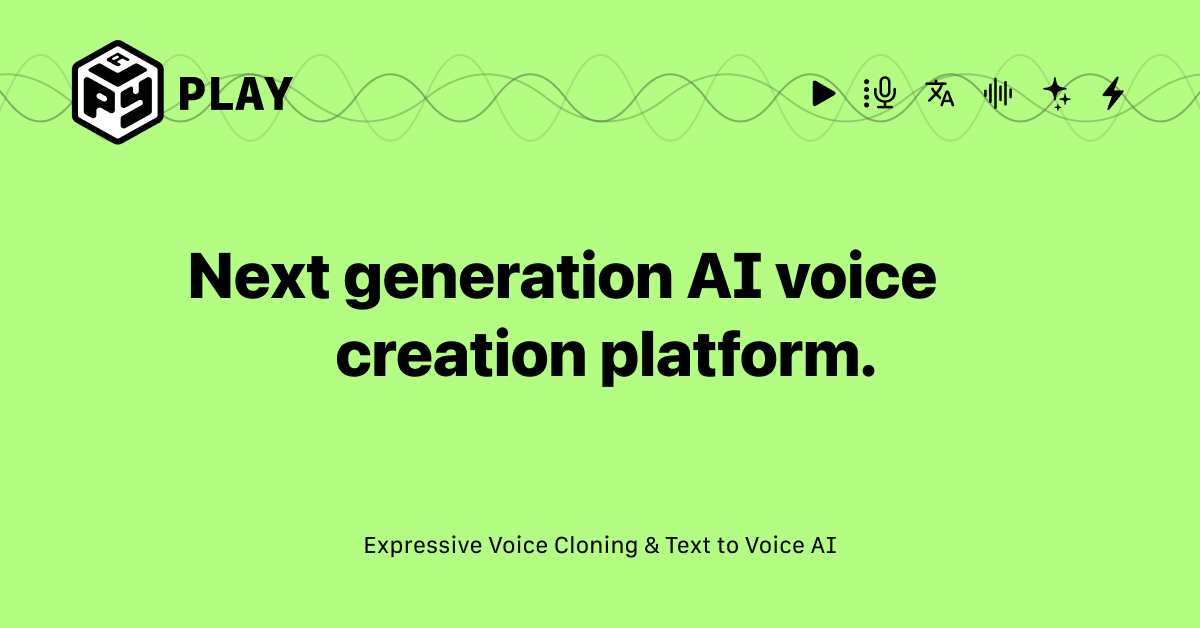Optimal Free Text-to-Speech & Speech-to-Text APIs, AI Models, and Open Source Solutions

This article presents a comprehensive evaluation of the leading free Text-to-Speech and Speech-to-Text APIs, AI models, and open source engines, with a particular focus on those offering a free tier. We aim to explore the nuances of choosing between an API, an AI model, and an open source library, highlighting the unique benefits and considerations of each.
Choosing the right Text-to-Speech or Speech-to-Text solution for your project involves balancing various factors such as accuracy, model architecture, features, support, documentation, and security. This decision can be especially challenging for smaller or experimental projects where you might be testing an API or AI model, or considering an API for development purposes.
Our article aims to simplify this decision-making process by providing a detailed comparison of the top free options available in the market. Whether you're leaning towards an API, an AI model, or an open source engine, this guide will help you make an informed choice, taking into account the specific needs and scope of your project.
Free Text-to-Speech and Speech-to-Text APIs and AI Models
APIs and AI models typically deliver higher accuracy, easier integration, and a broader range of ready-to-use features compared to their open source counterparts. However, it's important to note that extensive use of these APIs and AI models can lead to additional costs.
For smaller projects or for those in the experimental or trial phase, many of today's Text-to-Speech and Speech-to-Text APIs and AI models offer a free usage tier. This allows users to access the API or model without any charges up to a certain limit, which could be daily, monthly, or annually.
In this article, we will delve into five prominent Text-to-Speech and Speech-to-Text APIs and AI models that provide a free tier, including Unreal Speech, Eleven Labs, PlayHT, Google, and AWS Transcribe.
Unreal Speech
Unreal Speech is a cutting-edge text-to-speech (TTS) API designed to significantly reduce costs associated with TTS services. It stands out in the market for its affordability, being up to 10 times cheaper than competitors like Eleven Labs and Play.ht, and up to twice as economical as solutions from tech giants such as Amazon, Microsoft, and Google. This cost-effectiveness is a key feature, especially for high-volume users.
One of the notable aspects of Unreal Speech is its pricing structure, which is designed to become more cost-effective the more you use it. This makes it an attractive option for businesses or projects where large-scale text-to-speech conversion is a regular requirement. The service offers volume discounts, starting free and scaling up based on usage, with the cost per million characters decreasing as usage increases. This scalable pricing model is particularly beneficial for users with fluctuating or growing needs.
Unreal Speech provides a high-quality listening experience, as evidenced by testimonials from users who have experienced significant cost savings without compromising on audio quality. In fact, some users have noted that it offers better sound quality than Amazon Polly, a well-known player in the TTS market.
The platform is also user-friendly, offering a straightforward API that allows for easy integration into various applications. It supports a range of customizable options, including different voice types, bitrates, speech speeds, pitches, and codecs. This flexibility ensures that users can tailor the speech output to meet their specific requirements, whether for different types of content or varying audience needs.
Currently, Unreal Speech focuses on English-speaking voices, but there are plans to expand into multilingual support. This future expansion could make it an even more versatile tool for global applications. Additionally, while it does not currently offer custom voice cloning, this is another area where development is anticipated.
In terms of usage rights, audio generated with Unreal Speech can be used commercially. The terms vary based on the subscription plan, with free plans requiring attribution to Unreal Speech, while paid plans do not require any attribution.
In summary, Unreal Speech positions itself as a highly cost-effective, scalable, and user-friendly text-to-speech solution. Its focus on quality, combined with a flexible and affordable pricing model, makes it a compelling choice for a wide range of users, from individual creators to large-scale enterprises.

Play HT
Play.ht presents itself as a sophisticated AI voice generator and text-to-speech (TTS) platform, offering a wide array of features designed to create realistic and human-like voice performances. This platform is particularly notable for its extensive library of AI voices and its ability to cater to a variety of languages and accents, making it a versatile tool for various applications.
One of the key strengths of Play.ht is its expansive selection of over 800 natural-sounding AI voices. These voices are enhanced by advanced machine learning technology, ensuring that they deliver humanlike intonation and expression. This extensive range includes voices suitable for different types of content, such as conversational voices for podcasts and audiobooks, narrative voices for documentaries, and even character voices for gaming and creative videos. Additionally, the platform supports 142 languages and accents, enabling users to create content that resonates with a global audience.
Play.ht is designed to be contextually aware, offering emotional and expressive text-to-speech models. This feature is particularly useful for creating content that requires a specific tone or emotional resonance, such as marketing videos, explainer content, or entertainment. The platform's ability to generate conversational, long-form, or short-form voice content with consistent quality makes it a reliable tool for a wide range of users, from individual creators to large enterprises.
The platform also emphasizes security and privacy in voice generations, assuring users of the safety of their content. Additionally, it provides full commercial rights and copyrights for the generated audio, which is a crucial aspect for users intending to use the content for commercial purposes.
In terms of accessibility and ease of use, Play.ht addresses common questions about AI voice generation and text-to-speech technology, providing users with a comprehensive understanding of how to effectively use the platform. This includes information on customizations, commercial usage, and the realistic quality of AI-generated voices.
In summary, Play.ht stands out as a comprehensive and versatile AI voice generator and text-to-speech platform. Its wide range of voices, language support, and advanced features make it a suitable choice for a variety of applications, from audio publishing and e-learning to gaming and voice accessibility.

Google Speech-to-Text is recognized as a prominent speech transcription API in the industry. Google generously offers users an initial 60 minutes of free transcription, complemented by $300 in free credits applicable for Google Cloud hosting services.
However, it's important to note that Google's transcription service is primarily designed to work with files that are already stored in a Google Cloud Bucket. This specific requirement means that the provided free credits might not stretch as far as one might initially expect. Additionally, getting started with Google's service can present some challenges. To access even the free tier, users are required to set up a Google Cloud Platform (GCP) account and project. This process can be unexpectedly intricate and may pose a hurdle for those unfamiliar with Google's cloud services.
Despite these initial setup complexities, Google Speech-to-Text stands out for its high accuracy and extensive language support, covering over 63 languages. This makes it a viable option for users who are prepared to navigate the initial setup process. The effort invested in getting started can be worthwhile, especially for those who require reliable and accurate speech transcription across a diverse range of languages.

AWS Transcribe
AWS Transcribe is another notable player in the field of speech transcription services, offering users one hour of free transcription each month for the initial 12 months after signing up.
Similar to Google's offering, AWS requires users to first set up an AWS account, which can be a somewhat intricate process, especially for those who are new to Amazon's cloud services. This setup might be seen as a barrier for some users. Additionally, it's important to note that AWS Transcribe generally requires that files for transcription be located in an Amazon S3 bucket, which adds an extra step in the preparation process.
While AWS Transcribe is known to have slightly lower accuracy in comparison to some other transcription APIs, it still holds its ground with a set of unique features. Particularly noteworthy is its Transcribe Medical API, which is specifically tailored for medical transcription. This specialized Automatic Speech Recognition (ASR) service is currently available and offers a focused solution for healthcare professionals and organizations. This medical-focused transcription service is an example of AWS's commitment to catering to niche requirements, making it an appealing choice for users with specific needs like medical transcription.

Eleven Labs
Eleven Labs is revolutionizing digital interaction with its advanced generative voice AI technology. This platform enables users to easily clone or create synthetic voices, converting text to speech in an impressive range of 29 languages. Its AI voice generator excels in producing high-quality audio that captures human intonation and inflections, adjusting to context for a realistic experience. This feature is invaluable for content creators, enhancing videos, storytelling, and gaming experiences with lifelike speech.
The technology also significantly benefits the publishing industry by transforming written content into engaging audiobooks with natural voice and tone. Additionally, Eleven Labs is enhancing digital communication by enabling the creation of AI chatbots with human-like voices, improving user interactions in digital platforms.
A key feature of Eleven Labs is its VoiceLab, which allows voice cloning in one language and its use in others, offering versatility for various projects. The platform also provides a comprehensive workflow for long-form voice generation, ideal for audiobooks and other extensive content, with customizable speech pacing and audio editing.
Driven by cutting-edge research and a commitment to ethical AI, Eleven Labs is not just a voice generation tool but a pioneering platform reshaping how we engage with digital content across various industries.
Open Source Speech-to-Text Transcription Tools
As an alternative to using APIs and AI models, open source Speech-to-Text tools offer a completely free solution without usage limitations. A key advantage for some developers is the aspect of data security, as it eliminates the need to transmit data to external parties or cloud services.
However, it's important to note that utilizing open source engines requires significant effort. If you're prepared to invest considerable time and resources, especially for large-scale applications, these tools can be viable. Generally, open source Speech-to-Text tools may not match the accuracy levels of the previously mentioned APIs.
For those interested in exploring open source options, there are several noteworthy choices available.
DeepSpeech
DeepSpeech, an open-source embedded Speech-to-Text engine, is engineered to operate in real-time across various devices, from robust GPUs to a Raspberry Pi 4. This library employs an end-to-end model architecture initially developed by Baidu.
As an open-source solution, DeepSpeech offers commendable accuracy right from the start. Additionally, it is user-friendly in terms of fine-tuning and training with custom data sets.
Kaldi
Kaldi, a speech recognition toolkit, enjoys longstanding popularity within the research community. It shares similarities with DeepSpeech in terms of initial accuracy and the capability to train custom models. Kaldi's extensive testing and widespread use in production by numerous companies have bolstered its reputation and reliability among developers.
Wav2Letter
Developed by Facebook AI Research, Wav2Letter is an Automatic Speech Recognition (ASR) Toolkit. It's crafted in C++ and utilizes the ArrayFire tensor library. Wav2Letter, akin to DeepSpeech, offers respectable accuracy for an open-source tool and is user-friendly for smaller-scale projects.
SpeechBrain
SpeechBrain is a transcription toolkit based on PyTorch. This platform provides open implementations of significant research works and integrates closely with HuggingFace, facilitating easy access. It's well-structured and regularly updated, making it an efficient tool for both training and fine-tuning purposes.
Coqui
Coqui, another deep learning toolkit for Speech-to-Text transcription, supports over twenty languages and includes various features essential for inference and production. The platform regularly releases custom-trained models and features bindings for multiple programming languages, simplifying deployment.
Whisper
OpenAI's Whisper, launched in September 2022, stands on par with other leading open-source options in the field. It can be operated via Python or command line and is capable of multilingual translation. Whisper offers five distinct models, each suited to different use cases. However, running Whisper, especially on a large scale, requires a fast GPU and an in-house team for maintenance, scaling, and updates, which can increase the total cost of ownership. As of March 2023, Whisper is also available through an API, offering faster and more cost-effective solutions, with pricing starting at $0.006 per minute.
In conclusion
Choosing the Best Free Speech-to-Text API, Text-to-Speech AI Model, or Open Source Engine for Your Project
The selection of an appropriate free Speech-to-Text API, Text-to-Speech AI model, or open source engine largely depends on your project's specific needs. If you have a smaller-scale project and need a solution that is user-friendly, highly accurate, and comes with pre-built features, then one of these APIs could be an ideal choice:
On the other hand, if your priority is a completely free option without data usage restrictions and you're willing to invest more effort in customizing a toolkit, an open source library could be more appropriate. In this case, consider these options:
When making your decision, it's crucial to select a tool that not only fulfills your current project needs but also has the potential to accommodate the future evolution of your project.




